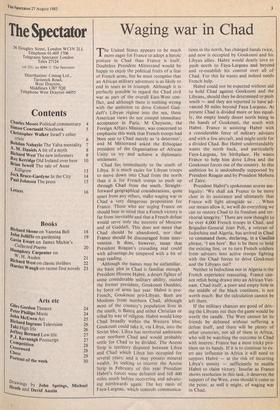Waging war in Chad
The United States appears to be much more eager for France to adopt a heroic posture in Chad than France is itself.
Doubtless President Mitterrand would be happy to enjoy the political fruits of a feat of French arms, but he must recognise that an African military adventure is as likely to end in tears as in triumph. Although it is perfectly possible to regard the Chad civil war as part of the overall East-West con- flict, and although there is nothing wrong with the ambition to drive Colonel Gad- dafi's Libyan regime into the sea, these American views do not compel immediate acceptance in Paris. M Cheysson, the Foreign Affairs Minister, was concerned to emphasise this week that French troops had been sent to Chad merely as 'a deterrent', and M Mitterrand asked the Ethiopian president of the Organisation of African Unity to try and achieve a diplomatic settlement.
Chad lies immediately to the south of Libya. It is much easier for Libyan troops to move down into Chad from the north than it is for French troops to push up through Chad from the south. Straight- forward geographical considerations, quite apart from any others, mike waging war in Chad a very dangerous proposition for France. Those who are urging France on should bear in mind that a French victory is far from inevitable and that a French defeat would serve only the interests of Moscow and of Gaddafi. This does not mean that Chad should be abandoned, nor that France should be discouraged from inter- vention. It does, however, mean that President Reagan's crusading zeal could with advantage be tempered with a bit of map reading.
Although the names may be unfamiliar, the basic plot in Chad is familiar enough. President Hissene Habre, a desert fighter of some considerable military ability, ousted the former president, Goukouni Oueddei, by force of arms last year. Habre is pro- French, Goukouni pro-Libyan. Both are Moslems from northern Chad, although most of the country's population lives in the south, is Banttt and either Christian or tribal by way of religion. Habre would keep Chad broadly within the Western bloc; Goukouni could take it, via Libya, into the Soviet bloc, Libya has territorial ambitions over northern Chad and would probably settle for Chad to be divided. The Aozou Strip is territory disputed between Libya and Chad which Libya has occupied for several years; and it may possess mineral wealth. In seeking to recover the Aozou Strip in February of this year President Habre's forces were defeated and fell 400 miles south before recovering and advanc- ing northwards again. The key oasis of Faya-Largeau, which controls communica- tions in the north, has changed hands twice, and now is occupied by Goukouni and his Libyan allies. Habre would dearly love to push north to Faya-Largeau and beyond and re-establish his control over all of Chad. For this he wants and indeed needs French help.
Habre could not be expected without aid to hold 'Chad against Goukouni and the Libyans, should they be determined to push south — and they are reported to have ad- vanced 50 miles beyond Faya Largeau. At present Chad is divided more or less equal- ly, the empty lonely desert north being in the hands of Goukouni, the south with Habre. France is assisting Habre with a considerable force of military advisers and with a few aircraft, and might settle for a divided Chad. But Habre understandably wants the north back, and particularly Faya-Largeau, his birthplace. He wants France to help him drive Libya and the Goukouni forces out of the country. In this ambition he is undoubtedly supported by President Reagan and by President Mobutu of Zaire.
President Habre's spokesman scorns am- biguity: 'We shall ask France to be more clear in its assistance and ultimately that France will fight alongside us . . , When our means allow it, we will do everything we can to restore Chad to its freedom and ter- ritorial integrity.' There are now thought to be over 4,000 French troops in Chad, and Brigadier-General Jean Poli, a veteran of Indochina and Algeria, has arrived in Chad to command them, declaring, in a Gaullist phrase, am here'. But is he there to hold the existing line, or to turn French soldiers from advisers into active troops fighting with the Chad forces to drive Goukouni and the Libyans out?
Neither in Indochina nor in Algeria is the French experience reassuring. France can- not relish being drawn into an African Viet- nam. Chad itself, a poor and empty hole in the middle of the black continent, is not worth much. But the calculation cannot be left there.
If the military chances are good of driv- ing the Libyans out then the game would be worth the candle. The West cannot let its friends be defeated without suffering a defeat itself, and there will be plenty of other countries, not all of them in Africa, who will be watching the outcome in Chad with interest. France has a most tricky pro- blem on its hands. If it is to continue to ex- ert any influence in Africa it will need to support Habre — at the risk of incurring Libya's enmity — sufficiently to enable Habre to claim victory. Insofar as France shows resolution in this task, it deserves the support of the West, even should it come to the point, as well it might, of waging war in Chad.


































 Previous page
Previous page